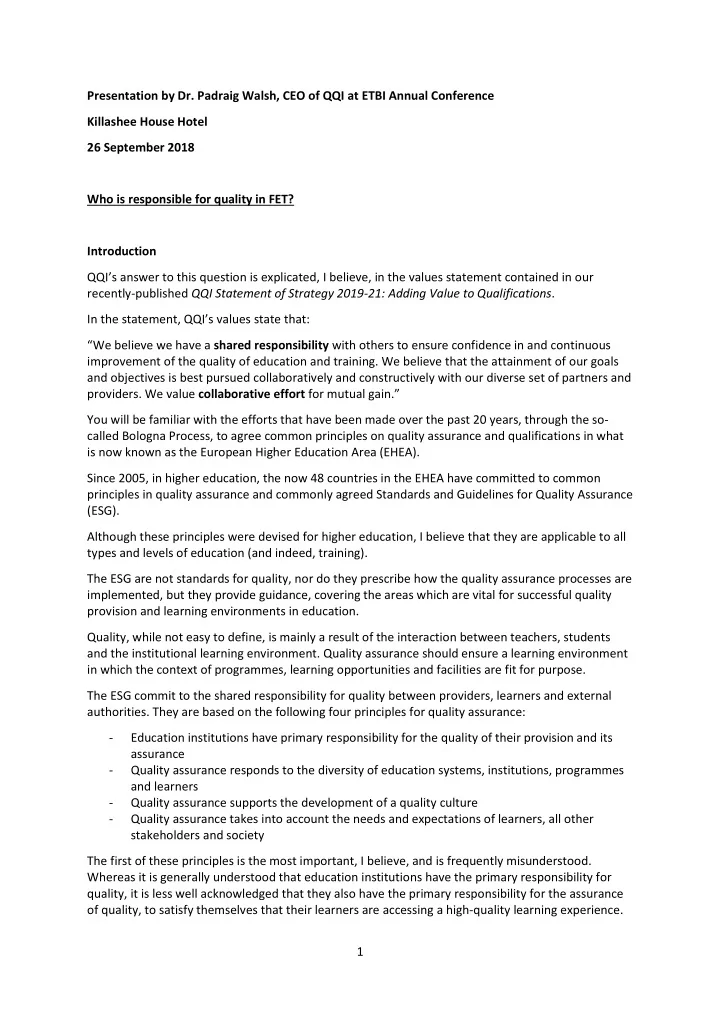

Presentation by Dr. Padraig Walsh, CEO of QQI at ETBI Annual Conference Killashee House Hotel 26 September 2018 Who is responsible for quality in FET? Introduction QQI’s answer to this question is explicated, I believe, in the values statement contained in our recently-published QQI Statement of Strategy 2019-21: Adding Value to Qualifications . In the statement, QQI’s values state that: “ We believe we have a shared responsibility with others to ensure confidence in and continuous improvement of the quality of education and training. We believe that the attainment of our goals and objectives is best pursued collaboratively and constructively with our diverse set of partners and providers. We value collaborative effort for mutual gai n.” You will be familiar with the efforts that have been made over the past 20 years, through the so- called Bologna Process, to agree common principles on quality assurance and qualifications in what is now known as the European Higher Education Area (EHEA). Since 2005, in higher education, the now 48 countries in the EHEA have committed to common principles in quality assurance and commonly agreed Standards and Guidelines for Quality Assurance (ESG). Although these principles were devised for higher education, I believe that they are applicable to all types and levels of education (and indeed, training). The ESG are not standards for quality, nor do they prescribe how the quality assurance processes are implemented, but they provide guidance, covering the areas which are vital for successful quality provision and learning environments in education. Quality, while not easy to define, is mainly a result of the interaction between teachers, students and the institutional learning environment. Quality assurance should ensure a learning environment in which the context of programmes, learning opportunities and facilities are fit for purpose. The ESG commit to the shared responsibility for quality between providers, learners and external authorities. They are based on the following four principles for quality assurance: - Education institutions have primary responsibility for the quality of their provision and its assurance - Quality assurance responds to the diversity of education systems, institutions, programmes and learners - Quality assurance supports the development of a quality culture - Quality assurance takes into account the needs and expectations of learners, all other stakeholders and society The first of these principles is the most important, I believe, and is frequently misunderstood. Whereas it is generally understood that education institutions have the primary responsibility for quality, it is less well acknowledged that they also have the primary responsibility for the assurance of quality, to satisfy themselves that their learners are accessing a high-quality learning experience. 1
The role of external quality assurance agencies like QQI is largely to ensure that the internal quality assurance systems put in place by providers, such as the Education and Training Boards, are effective. Our role in FET is to evaluate how seriously the ETBs are taking their responsibility for quality and its assurance, to publicly report on our findings, to commend good practice where we find it and to make recommendations for improvement where deficiencies are found. Quality Assurance in Further Education – current state QQI ’s responsibility begins with the issuing of statutory quality assurance guidelines to providers of education and training and providers should, when developing their own quality assurance procedures, take account of these guidelines. In 2016, QQI, following consultation with stakeholders, developed and published core QA guidelines that apply to all providers of education and training. This decision came about because we believe that there are certain core principles that apply to all types of education and training, be it general, vocational or higher. This reflects a growing trend internationally to a more unified approach to tertiary or post-secondary education in countries like Australia, New Zealand, Scotland and Wales. Indeed, developments in Ireland such as the establishment of QQI, the widening of Apprenticeship provision across Levels 5-9 (and possibly 10) of the NFQ, the structural changes in the Department of Education and Skills that now house Further and Higher Education under a single Assistant Secretary. More recently, I have been asked to assist the Welsh government in their development of a post- compulsory Education and Training Commission following the recommendations in the Hazelkorn report. The Welsh has been positively influenced by QQI’s approach of issuing core QA Guidelines for all education and training providers. As you know, we have supplemented the core QA guidelines with additional sector-specific and topic- specific guidelines that are appropriate to the scope of a provider’s provision. For the ETBs, this involves engaging with guidelines specifically developed for the ETB sector but also guidelines for providers of national apprenticeship programmes. ETBs are aware that the quality assurance procedures must be comprehensive and cover all education, training and related services provided by ETBs, regardless of whether these lead to QQI awards or awards of other awarding bodies or indeed lead to no award. Initial quality dialogue meetings between QQI and ETBs A senior team from QQI, including myself, the Head of Access and Lifelong Learning, Andrina Wafer and other colleagues visited the 16 ETBs over the period 7 November – 8 December 2017. At the meetings, the QQI team met with the relevant Chief Executive and Further Education and Training Director and their teams which typically included Training Centre Managers and Officers, Principals/Vice-Principals of Further Education Colleges, VTOS and Youthreach co-ordinators and Adult Education Officers. The ‘dialogue’ meetings were so -called as they allowed an ETB to present the new FET management teams and the new governance systems that were being put in place. The presentations confirmed to QQI that ETBs were very much taking on board the importance of quality assurance being ‘ETB - owned and ETB- led’. Th ere was a strong sense that ETBs were assuming corporate responsibility for quality assurance over the range of their further education and training provision, be it delivered through PLC, VTOS, Youthreach, Adult and Community Education or training centres. 2
Recommend
More recommend